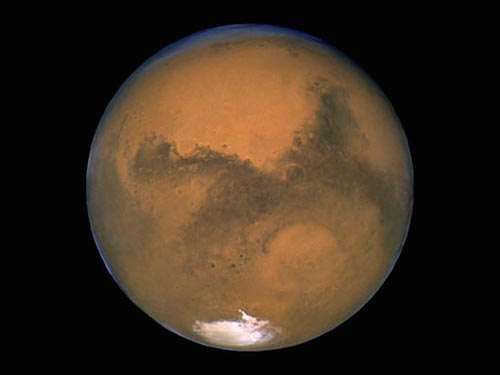 Intelligent Design
Intelligent Design
 News Media
News Media
 Physics, Earth & Space
Physics, Earth & Space
Slate Says We’re Afraid of Life on Mars — Right After We Published an Article Explaining Why Martian Life Wouldn’t Challenge ID

The debate over intelligent design isn’t a right vs. left issue, but there must be an editorial style guide in use at various left-leaning anti-ID Internet news outlets that tells reporters how to write about challenges to evolutionary orthodoxy. That’s the only explanation I can think of for how, when it comes to ID, journalists at these venues all seem to express themselves in the same way. I imagine this style guide as advising, “Whenever critiquing Discovery Institute or other proponents of the theory of intelligent design, be certain to call them ‘creationists’ and mock them for being ‘terrified,’ ‘running scared,’ ‘quaking in their boots,’ etc. about any and all hypothetical developments in evolution-related science.”
Here’s what I mean. The other day, Slate ran an article headlined “Why Creationists Are Praying We Never Find Alien Life.” That was on the heels of a piece in Salon titled “God Is on the Ropes: The Brilliant New Science that Has Creationists and the Christian Right Terrified,” which in turn followed in the tradition of a Mother Jones article by Chris Mooney, “This Picture Has Creationists Terrified.” (Mooney was referring to “photographs of the chromosomes of humans, chimpanzees, gorillas, and orangutans, aligned in that order for each chromosome.”)
Daniel Bakken wrote an excellent response to the Slate piece (see here), and we also replied to Salon (here) and Mother Jones (here).
The irony of the recent Slate piece, though, is its terrible timing. Writer Mark Strauss’s main point is that Discovery Institute and ID proponents, whom he predictably calls “creationists,” are supposedly terrified at the prospect of life on other planets. He gives Mars as an example. Yet the very same day that the Slate article came out, our cover story at Evolution News & Views (originally published a couple of days before) made it clear that life on Mars would pose no problem at all for ID. Why is that? Because if extraterrestrial life exists, it couldn’t have been produced by unguided evolution. On the contrary, it likely came from Earth, where it arose by intelligent design. Here’s what I wrote (“Sure, There Might Be Life on Mars — But Evolutionary Thinking Doesn’t Help Explain Why“):
I don’t automatically dismiss the idea that we might one day find life (or evidence of past life) on Mars. However, simply having an ocean [on Mars] for 1.2 billion years is not a good enough reason to expect that. Why? It’s not sufficient time to for life to arise or “get more complex” via unguided evolutionary mechanisms.
A materialist may initially find it difficult to grasp what I’m saying here. “Life on Earth appeared within just a few hundred million years of the end of the late heavy bombardment period,” he may reason, “so surely it would not take 1.2 billion years for complex life to evolve on Mars.” And that’s the mistake in materialists’ thinking: They assume that anywhere life exists — Earth, Mars, wherever — that it exists there because of unguided chemical evolution. It’s sort of an unofficial but unchangeable premise of the entire field of astrobiology that life exists only because it evolves. In reality, though, life on Earth is irreducibly complex in such a spectacular manner that even 1.2 billion years represents a dramatically inadequate time frame for life to arise and reach its presently complex state via unguided chemical and biological processes. As I explained here, liquid water alone is not remotely enough to expect the existence of life.
So are there any good reasons to hope for life on Mars? There might be — but guess what, they were developed (in part) by a proponent of intelligent design. Guillermo Gonzalez advocates the concept that nearby bodies like Mars or the Moon might be “earth’s attic.” In that scenario, rocks and even organic material ejected from Earth might eventually find their way to Mars.
So let’s see here. Days before Slate published its hit piece on Discovery Institute, we had already said there’s no difficulty whatsoever for ID if scientists find life on Mars. Yet Slate specifically claims we’re afraid of Martian ETs. Sorry, guys. Maybe it’s time to revise that old style guide, or better yet, make plausible and credible arguments when launching attacks on those you label “creationists.”
Image credit: NASA/Hubble Space Telescope.
